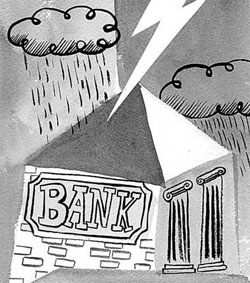 James Bullard, president St. Louis Fed, says breaking up big banks is a good idea in theory:
James Bullard, president St. Louis Fed, says breaking up big banks is a good idea in theory:
“If you had a clear road map, I’d be for it,” Bullard said Thursday at the Hyman P. Minsky Conference in New York. “If there was a good way to do so, if you had a clear road map about how you were going to go about it, and why you were going to break them up in this particular way.”
Matt Yglesias is “frustrated” by statements like this: “I suppose I agree with that, but ‘how’ is not a minor issue here. The country would really benefit from one or more of these guys — who, after all, have some real expertise and credibility in the field of bank regulation — developing some kind of more specific idea that could then be subjected to specific scrutiny and/or gain support.”
I think this is unfair. If you read Bullard’s remarks, he’s basically saying that he’s not really sure there is a practical way to do this. That’s a perfectly reasonable stand to take. There are lots of things that are good in theory but hard to implement in practice, and sometimes that’s the right thing to say about them.
As it happens, my primary objection to spending energy breaking up big banks is that I’m just not sure it would really fix anything. Blanche Lincoln, for example, has floated the idea of forcing big banks to spin off their derivatives trading operations. Sounds good! And from a prudential point of view, it really might be a good idea. But from the point of view of bank sector profitability and political power, I’m not sure what difference it makes. The danger of derivatives abuse would still be there and would still pose systemic danger, it would just emanate from a different source.
Still, this is quite possibly the right approach if you really do want to break up banks. Instead of placing an arbitrary cap on assets, regulate what businesses they can be it. If a single firm could only engage in (pick one) commercial banking, investment banking, trading on their own account, derivatives underwriting, insurance, or private equity, that would force a radical downsizing. Add in a requirement that capital requirements go up along with size, and individual actors even within single sectors would have a strong incentive to stay small. I don’t know for sure that this would be the best approach, but it’s at least feasible. And while I don’t think Bullard has any obligation to flesh this out, the folks who are dedicated to breaking up the banks probably do. Not in mind-numbing detail, but at least in enough detail to explain how it would work in the real world.
In the meantime, I’d rather have ten big banks with serious leverage constraints than 50 with weak constraints, and there are plenty of good proposals for how to accomplish that. All we lack is the political will to get it done. Maybe the SEC’s suit against Goldman Sachs will wake up a few people and help put a little steel in their spines.


















